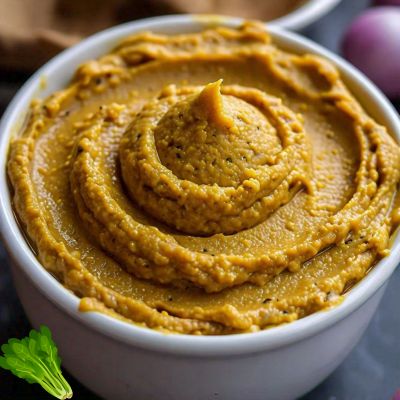Mustard is a common condiment found in almost every kitchen. It’s made by mixing mustard seeds, typically yellow, with ingredients like vinegar, salt, and sometimes lemon. Other types are also produced using brown or black mustard seeds. Let’s explore whether mustard is good for your health, its benefits, nutritional content, and some potential risks.

Is Mustard Healthy?
Yes, mustard is healthy, mainly because it contains antioxidants that offer various health benefits. These benefits include fighting cancer, bacteria, viruses, fungi, and reducing inflammation. Mustard is low in calories, making it an excellent substitute for richer condiments such as mayonnaise.
Health Benefits of Mustard
Although mustard is usually eaten in small amounts, it still has some surprising health benefits. Here are some ways mustard can be good for you:
01. Antioxidant Power
Mustard contains two powerful antioxidants: isothiocyanates and sinigrin. These antioxidants are known for their potential anti-cancer properties. Isothiocyanates, which give mustard its spicy flavor, have been linked to reducing the risk of cancers such as breast, lung, gastrointestinal, and prostate cancers. However, more research and investigations are needed to confirm these benefits.
02. Helps Manage Diabetes and Cholesterol
Isothiocyanates could also play a role in managing diabetes and reducing harmful cholesterol levels, contributing positively to heart. Initial research indicates that these compounds may have neurological advantages, particularly for those with autism, though further investigation is needed in this area.
03. Fights Infections and Reduces Inflammation
Sinigrin, another antioxidant in mustard, becomes active when mustard seeds are crushed or damaged. This compound has been shown to help fight bacteria, viruses, and fungi. It may also reduce inflammation and work in wound healing.
[Read more : Creamy Spinach Chicken Recipe – Quick & Healthy Family Meal]
Traditional Remedies
In the past, herbalists used white mustard seeds mixed with honey to help improve the voice and treat throat issues.
While these potential benefits are promising, it’s important to note that mustard should not replace medical treatments. There is currently insufficient strong evidence to back the use of mustard in cosmetics or medicine.
Nutritional Information
One teaspoon of prepared yellow mustard has only about 3 calories, according to USDA data. This makes mustard a low-calorie option, especially compared to condiments like mayonnaise. The calories mainly come from carbohydrates, but since they are minimal, they don’t make a big difference in your daily calorie intake.
Dijon mustard may have a slightly higher calorie count, but it’s still low, with around 10 calories per serving. Mustard doesn’t contain any significant vitamins or minerals, so while it’s tasty, it doesn’t offer a huge nutritional punch in terms of micronutrients.
Selection, Preparation and Storage
You can easily find mustard at any grocery store, where the most common varieties are yellow mustard and Dijon mustard. For more exotic options, specialty stores carry different types, such as mustard flavored with honey, spicy peppers, or even wine.
Since mustard loses its flavor over time, it’s a good idea to buy it in small amounts. Once opened, you should store mustard in the refrigerator, where it will stay fresh for up to a year.
Mustard’s strong, spicy flavor makes it a great match for meats, seafood, and salad dressings. Whether you’re grilling or making a sandwich, mustard can add a bold kick without adding too many calories.
Is Mustard Safe?
The U.S. Food and Drug Administration (FDA) considers mustard safe when eaten in typical food amounts. However, if you’re using mustard for cosmetic or medicinal purposes, you need to be cautious.
For example, applying mustard seeds directly to the skin for a long period can cause burns, blisters, or ulcers. Ingesting large amounts of black mustard seeds can lead to severe side effects like throat damage, heart failure, diarrhea, breathing issues, and even coma in extreme cases.
Mustard Allergies
Mustard allergies are not uncommon. If you have a mustard allergy, you may experience a reaction to any part of the mustard plant, including the seeds, leaves, flowers, and mustard oil. Symptoms of an allergy may vary from mild to severe. These could include:
- A rash or itchy feeling in the mouth
- Trouble breathing or other respiratory issues
If you suspect a mustard allergy, it’s best to avoid all mustard-related products and consult with a healthcare provider.
Conclusion
In conclusion, mustard is a healthy, low-calorie condiment that adds flavor to your meals while providing some impressive health benefits. The antioxidants found in it, especially isothiocyanates and sinigrin, may assist in combating cancer alleviating inflammation, and enhancing heart health. However, it’s important to be mindful of potential allergies and not overuse mustard for medicinal purposes without proper guidance.
When used in moderation, mustard can be a flavorful addition to a balanced diet, offering a tasty yet health-conscious alternative to more calorie-dense condiments.
[Read more : Honey : Nutritional Benefits & Health Impacts]
****************************
Frequently Asked Questions
Q1. What types of mustard are used in cooking?
Mustard is used in various forms: mustard seeds, mustard powder, and mustard sauce (like yellow or Dijon). Each adds a distinct flavor, from mild to spicy.
Q2. What dishes commonly include mustard?
Mustard is often used in salad dressings, marinades, pickles, and sauces. It’s also a popular ingredient in sandwiches, burgers, and grilled meats.
Q3. How does mustard enhance the flavor of food?
Mustard adds a tangy, sharp, or spicy flavor, depending on the variety. It acts as a flavor enhancer and balances rich, fatty dishes.
Q4. Are mustard seeds different from mustard sauce?
Yes, mustard seeds are whole seeds used in cooking or spice blends. Mustard sauce is a condiment made from ground mustard seeds mixed with vinegar, water, and other ingredients.
Q5. Can mustard be used in vegetarian or vegan dishes?
Absolutely! Mustard is plant-based and can be added to salads, roasted vegetables, or vegan burgers for extra flavor.
Q6. Is mustard good for digestion?
Yes, mustard contains compounds that may stimulate digestive enzymes, helping with digestion and reducing bloating.
Q7. What are the health benefits of mustard?
Mustard is rich in antioxidants, has anti-inflammatory properties, and contains nutrients like selenium, magnesium, and omega-3 fatty acids, which support heart health.
Q8. Is mustard safe to consume daily?
In moderate amounts, mustard is safe and can be a healthy addition to your diet. However, excessive consumption might cause stomach irritation in sensitive individuals.

2 thoughts on “Is Mustard Good for You? Discover the Health Benefits, Nutrition Facts, and Possible Risks”